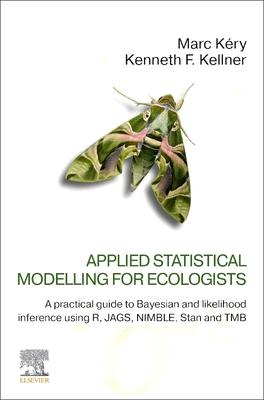Applied Statistical Modelling for Ecologists provides a gentle introduction to the essential models of applied statistics: linear models, generalized linear models, mixed and hierarchical models. All models are fit with both a likelihood and a Bayesian approach, using several powerful software packages widely used in research publications: JAGS, NIMBLE, Stan, and TMB. In addition, the foundational method of maximum likelihood is explained in a manner that ecologists can really understand. This book is the successor of the widely used Introduction to WinBUGS for Ecologists (Kry, Academic Press, 2010). Like its parent, it is extremely effective for both classroom use and self-study, allowing students and researchers alike to quickly learn, understand, and carry out a very wide range of statistical modelling tasks. The examples in Applied Statistical Modelling for Ecologists come from ecology and the environmental sciences, but the underlying statistical models are very widely used by scientists across many disciplines. This book will be useful for anybody who needs to learn and quickly become proficient in statistical modelling, with either a likelihood or a Bayesian focus, and in the model-fitting engines covered, including the three latest packages NIMBLE, Stan, and TMB.

Applied Statistical Modelling for Ecologists: A Practical Guide to Bayesian and Likelihood Inference Using R, Jags, Nimble, Stan and Tmb
Applied Statistical Modelling for Ecologists provides a gentle introduction to the essential models of applied statistics: linear models, generalized linear models, mixed and hierarchical models. All models are fit with both a likelihood and a Bayesian approach, using several powerful software packages widely used in research publications: JAGS, NIMBLE, Stan, and TMB. In addition, the foundational method of maximum likelihood is explained in a manner that ecologists can really understand. This book is the successor of the widely used Introduction to WinBUGS for Ecologists (Kry, Academic Press, 2010). Like its parent, it is extremely effective for both classroom use and self-study, allowing students and researchers alike to quickly learn, understand, and carry out a very wide range of statistical modelling tasks. The examples in Applied Statistical Modelling for Ecologists come from ecology and the environmental sciences, but the underlying statistical models are very widely used by scientists across many disciplines. This book will be useful for anybody who needs to learn and quickly become proficient in statistical modelling, with either a likelihood or a Bayesian focus, and in the model-fitting engines covered, including the three latest packages NIMBLE, Stan, and TMB.